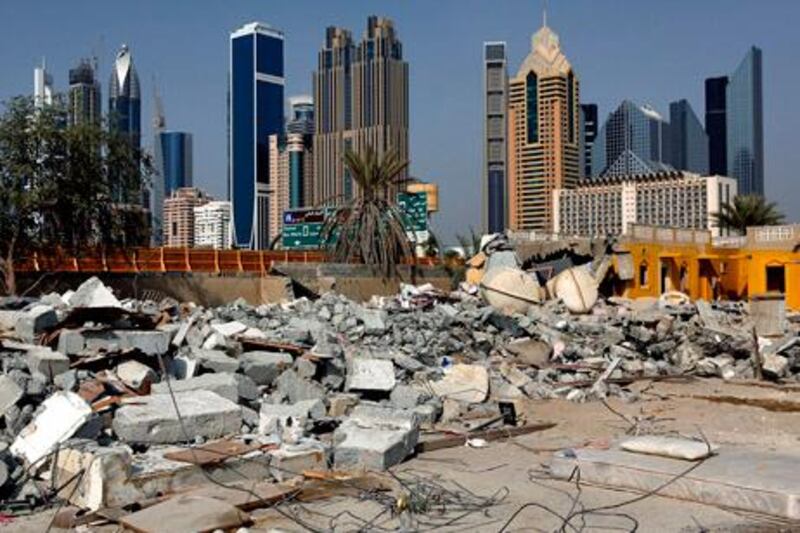DUBAI // Families in a government compound in Al Satwa are living with hazardous asbestos, exposed by demolition work on car park roofs at homes built for police personnel.
While the roofs were built before the nation's ban on the material came into force seven years ago, workers appear not to be following the regulations for its removal, putting their own health and that of residents at risk.
Residents at the compound said they had not been warned that the demolition works posed any risks to their health.
One resident, who identified himself only as Abu Faris, said his family had to wash their cars twice daily because of the dust.
"If we can see it on the cars that means we are breathing it," the father of two said.
Asbestos cement, a once popular building material, has been banned in more than 60 countries.
When disturbed, tiny fibres become airborne and can penetrate deep into people's lungs.
Removing the material should be carried out using techniques that minimise the chances of fibres becoming airborne. But during a visit to the site on July 26, some of the old roofing was seen crushed and mixed with other building waste.
A second visit, on August 13, found a similar situation. While much of the rubble had been cleared, pieces of asbestos were still clearly visible mixed with the general waste.
The waste was being scooped up by an excavator, the operator of which was not wearing a mask. A bed had been set up next to a heap of crushed asbestos.
The site was just metres away from the rest of the compound, where some families are still living.
An asbestos removal expert who visited the site said the way the demolition was being handled risked the health of workers and the public.
"It is always preferable to remove asbestos prior to demolition," said the expert.
"Typically this is carried out by a specialist asbestos removal contractor, who has trained and competent staff, experience in safe asbestos removal, control measures and appropriate personal and respiratory protective equipment."
There were no barriers preventing members of the public from entering the demolition site.
"When asbestos materials are damaged or disturbed they release asbestos fibres into the air," the expert said.
"Given the proximity of the buildings to the demolition, the fact that asbestos materials are being demolished by an excavator and without any dust-suppression control measures, there is a risk of asbestos exposure to local residents, members of the public and the workers involved in the demolition."
Exposure to asbestos can cause a reaction with symptoms similar to those of pneumonia. Exposure over many years can lead to lung scarring, pleural disease and lung cancer.
Ibtissam Othman, whose house is just metres from the debris, said the demolition dust had bothered her and her family.
But she had not heard of asbestos or the risks associated. Neither had her neighbour, Hamed Rashid.
"Two years ago a lot of nearby buildings were demolished," Mr Rashid said. "No one told us about the risk."
The contractor carrying out the work said the claims would be investigated.
Mr ME Ayoob, managing partner of World Wide Building and Demolition, said: "The asbestos sheets are generally transported to our warehouses in Sharjah for careful disposal. This instance seems to be an exception.
"We are looking into the matter, and ensuring that our teams take all the necessary steps to maintain the highest safety standards."
A spokesman for the site's developer, Meraas, said: "Any contractors who prove not to be adhering to required safety standards will be considered for black-listing from Meraas future projects."
vtodorova@thenational.ae
malkhan@thenational.ae
Deadly dust: Dubai residents fear asbestos exposure
Families in a government compound in Al Satwa are living with hazardous asbestos, exposed by demolition work on car park roofs at homes built for police personnel.

Editor's picks
More from the national




